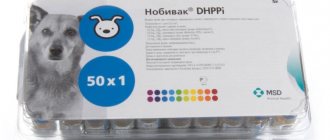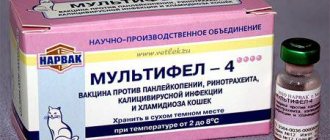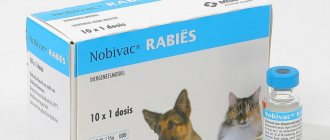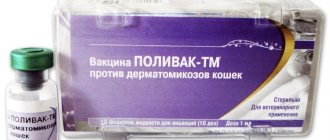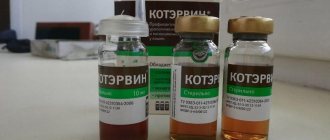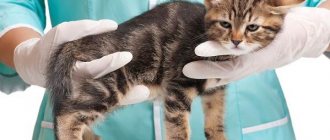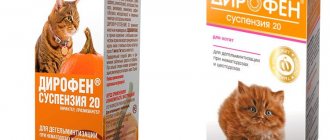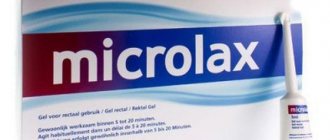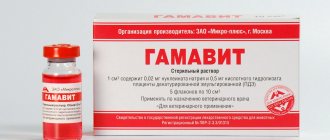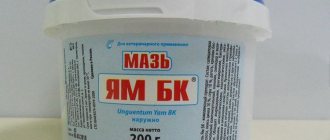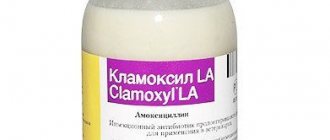Compound
The Purevax vaccine is a live, modified drug that represents viruses, for example, merial in a weakened form. After administering it to male cats, after two weeks a peculiar immune response occurs in their body to diseases such as chlamydia, panleukopenia, rhinotracheitis and calicivirosis. The increased immune reaction against the pathogens of these diseases lasts for about a year.
© shutterstock
The vaccine contains:
- beige powder, which includes weakened antibodies of pathogens;
- a sterile solution that is mixed with the powder for injection.
Characteristics of the Purevax vaccine for cats
Purevax RCPCh was developed in France, the vaccine manufacturer is Merial. This drug is intended to combat very serious infectious diseases that can be transmitted to humans. The French managed to create a high-quality product that quickly became popular.
Composition and release form
Purevax is available in glass bottles with a dense rubber stopper, which is protected by an aluminum lining. One bottle contains 1 dose. The kit includes a solvent for preparing a mixture for injection. The package, which is made of plastic, contains 10 doses of the vaccine and 10 doses of diluent.
Under the name (Purevax), 4 types of vaccines are produced, each of which is designed to protect against certain infections:
- Purevax FeLV - against feline viral leukemia;
- Purevax RCPCh is intended to protect against: panleukopenia;
- viral rhinotracheitis;
- calcivirosis;
- chlamydia.
- panleukopenia;
- rhinotracheitis;
Photo gallery: types of Purevax vaccine
Purevax FeLV vaccine acts against feline viral leukemia
Purevax RCP is used against infection with panleukopenia, rhinotracheitis and calicivirus of domestic cats
Purevax RCPCh is a vaccine created specifically for cats that allows them to build immunity against a number of infectious diseases.
Purevax RCP Rabies includes protection against the rabies virus
The vaccine itself consists of live, but weakened strains, which are sufficient for the immune system to produce antibodies, but are not themselves able to in any way harm the health of the animal. Externally, the drug looks like a milky powder. The solvent for the vaccine is a sterile solution for injection.
Properties of the drug
After being introduced into the cat’s body, the vaccine begins to work within 2–4 weeks (for a specific group of diseases there are different times). The immunity that is developed through the work of the vaccine lasts only 12 months. Therefore, vaccination must be repeated regularly (once a year).
Video: why animals are vaccinated every year
Release form
A high-quality vaccine for cats is produced in glass bottles with a capacity of 1 ml. They are sealed at the top with a rubber stopper and covered with metal lids. On the label attached to each bottle, you can read the trade name of the vaccine - Purevax RCP, the purpose of the drug, as well as the volume of the bottle and the name of the manufacturer. The expiration date of the medicine is also indicated below. The package contains 10 doses.
The shelf life of Purevax is 1.5 years from the date of production. The vaccine should be stored in the refrigerator or at a temperature of 2 to 8 degrees. The medicine cannot be frozen, otherwise it will simply lose its properties, since pathogens simply die when exposed to low temperatures.
If the vaccine is expired or was stored incorrectly, then giving it to a cat is strictly prohibited - the animal may become seriously ill or even die.
Owner reviews
Maria, owner of a 4-month-old kitten:
“When a kitten appeared in the house, I learned about the need for vaccination. We went to the clinic. The doctor recommended a product from a French manufacturer, specifying that it was safer. After vaccination, the baby completely refused food and water. I had to suck it out of the syringe, but this did not help much, since vomiting occurred periodically. The kitten lay flat and hardly got up for 3 days, then gradually began to come to life. In general, the impressions were not the best; I will not vaccinate my cat again.”
Valentina, owner of the Siamese cat:
“We vaccinated our cat for the first time at 7 months. After the injection, he slept the whole day, but there were no other side effects. A week later I started sniffling due to a stuffy nose. I think it's because of Purevax, but the veterinarians rejected my assumption. To be fair, it should be said that the cat recovered quickly after the prescribed treatment.”
Contraindications
The Purevax vaccine is always prescribed to male cats separately. It cannot be used together with other compounds. All medications can only be used after 165 days have passed before and after Purevax injection.
The vaccine can achieve its maximum effectiveness only if no immunoglobulins or anti-inflammatory drugs interfere with the gradual increase in your pet’s immunity.
The only drug that is allowed for use during treatment with Purevax is the rabies vaccine Rabizin. These medications can be used together in an animal, but must be administered separately.
© shutterstock
Additional contraindications for treating cats with Purevax are::
- pregnancy or lactation period in a cat;
- severe physical exhaustion;
- during the peak of the disease;
- if deworming has not been completed (treatment for intestinal parasites);
- with hypersensitivity to the components of this drug.
After the injection, you can note how the animal’s character has changed: the cat may become aggressive, refuse to eat, a short-term fever may also appear, or slight swelling at the injection site.
Contraindications and side effects
Purevax is generally well tolerated by cats. The exception is hypersensitive animals.
The owner may notice in a cat after vaccination:
- lethargy, drowsiness;
- slight increase in temperature;
- lack of appetite;
- the appearance of compaction or slight swelling at the injection site.
These phenomena go away on their own and do not require veterinarian intervention, except for the appearance of an allergic reaction. In this case, treatment is prescribed according to the observed symptoms.
It is prohibited to vaccinate:
- weakened and emaciated animals;
Sick and exhausted animals are not subject to vaccination
- cats suspected of having diseases against which the vaccine is intended;
- pregnant and lactating females;
- kittens younger than 8 weeks;
- pets that have not been dewormed.
Dosage
You can give Purevax to a cat only when the animal is absolutely healthy, otherwise there is a risk of complications from an already established disease.
You need to carry out the injections yourself with a sterile needle, or take your cat to a veterinarian.
The procedure for administering the vaccine is simple:
- Open both bottles.
- Add 1 ml of solvent to the powder vial using a sterile syringe.
- Shake until the powder is completely dissolved.
- Fill a syringe with the vaccine and inject it into your pet's shoulder blade.
This vaccine is administered in doses corresponding to the instructions after kittens reach 8 weeks of age.
This immune vaccination is carried out twice: at 2 months and three weeks after.
If an examination of the animal reveals an increased level of maternal antibodies, then vaccination can be postponed until the cat reaches 4 months of age.
If allergic reactions occur after using Purevax, treatment is symptomatic.
In the event that your cat is not the only pet, then all animals are vaccinated at once.
How to use
The instructions for use contain detailed instructions on how to use Purevax for cats. A few simple rules must be followed:
- Liquid and dry components must be mixed immediately before administration. The prepared solution cannot be stored.
- During the procedure, you must adhere to the rules of asepsis and antisepsis.
- 10 days before vaccination, you need to deworm your pet using suitable anthelmintics. This rule should not be neglected, since parasites significantly reduce the animal’s immunity, which can cause complications after vaccination.
- Injections are given subcutaneously.
- If several animals are being vaccinated at the same time, a new sterile syringe should be used for each pet.
The dosage is calculated simply - 1 ml is needed per animal, regardless of the animal’s weight. To mix the contents of both bottles, the liquid is drawn into a syringe and then injected into the container with the dry component. Afterwards you need to shake the bottle well so that the mixture becomes homogeneous. Only after this the solution can be administered to the pet.
The first injection is given at 8 weeks. To develop strong immunity, the injection is repeated at 12 weeks. Then revaccination is carried out every 12 months. It is important not to disrupt the immunization schedule.
Note! It is strictly forbidden to combine the use of Purevax with other vaccinations. Only combined use with the Rabizin vaccine against rabies is allowed.
Pros and cons of the vaccine
The Purevax vaccine administered to a cat is not a therapeutic drug, it is just a live vaccine containing a pathogenic virus, of course, in a weakened form.
This drug is a perfect and modern medicine, because by causing an infection artificially, Purevax carries it out in the cat’s body within the allotted time and does not provoke the onset of the disease itself.
After the injection, cats do not risk infecting themselves and their owners with dangerous diseases; in addition, Purevax does not cause any pathological changes, and all animals that have been vaccinated feel great. No fatal cases have been reported.
© shutterstock
Finally, the Purevax vaccine creates immunity that is stronger than that acquired from birth.
However, with all the obvious advantages, this medicine also has disadvantages.:
- Virus mutations. When viruses enter the body of a cat, they can mutate, that is, change their genetic structure and obtain a completely new strain. And if the cat was vaccinated with Purevax, which has developed protection against a certain type of virus, then the injection may be useless, and the animal will still get sick. Such mutations after vaccination are rare, but do occur.
- Mixed infection . The viral nature of various diseases that have “crossed” with each other can break through the immune defense built by Purevax in your pet’s body. Such cases are also extremely rare.
- The vaccine is applied to an already sick cat . This is just a common occurrence. The owners are negligent in caring for the animal and do not immediately notice signs of disease, as well as changes in the pet’s character and lifestyle. And when the animal is already sick, they take it to the veterinarian, or they inject Purevax on their own. And sometimes they skip annual vaccinations, putting the cat’s life in danger. In this case, Purevax will simply provoke complications, as it will add even more viruses to the animal’s already weakened body.
Price and analogues
One dose of Purevax (Purevax RCP) costs 480 rubles. You can purchase the drug at veterinary pharmacies or animal clinics.
Modified live vaccine generates a powerful immune response
Table: analogues of the Purevax vaccine
| Name | Type of vaccine | Manufacturer country | What diseases does it protect against? | Price, rubles | Compared to Purevax RCP | |
| pros | Minuses | |||||
| Nobivac Triquet Trio | Live | Netherlands |
| 360 | Lower price | Harder to bear |
| Quadricate | Inactivated | France |
| 680 | Rabies protection | Significantly higher price |
| Multifel-4 | Inactivated | Russia |
| 229 | Lower price | There is no international certificate; the animal will not be released outside Russia |
| Felovax-4 | Inactivated | USA |
| 515 | Protection against chlamydia | Higher price |
| Felocel CVR | Live | USA |
| 359 | Lower price | Harder to bear |
| Biofel PCHR | Inactivated | Czech |
| 197 | Significantly lower price | Less common |
Veterinarians recommend sticking to one type of vaccine throughout the animal's life. Therefore, choose proven drugs from well-known manufacturers.
Indications for use in cats
The main diseases in the cat family for which this vaccine is used are:
Vaccine administration to a cat
- rabies;
- calicivirus;
- rhinotracheitis;
- distemper in cats (panleukopenia);
- as well as chlamydia.
Note! This is not a complete list of diseases; it is also used for other diseases.
It is necessary to vaccinate first of all those pets that are not only inside the apartment or house, but also go outside.
